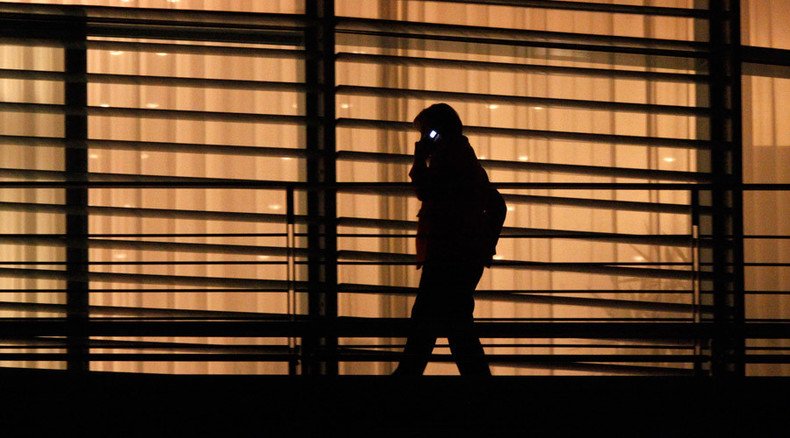Cellphones, wireless devices connected to cancer - study

Radiation emitted from wireless devices can cause a metabolic imbalance in users, which can lead to various health risks including cancer and neurodegenerative disease, according to a new study.
A review article -- “Oxidative Mechanisms of Biological Activity of Low-intensity Radiofrequency Radiation" -- published this month in Electromagnetic Biology & Medicine collected available, peer-reviewed experimental data on "oxidative effects of low-intensity radiofrequency radiation (RFR) in living cells."
Such a metabolic imbalance, or oxidative stress, is “an imbalance between the production of reactive oxygen species (ROS) and antioxidant defense," according to co-author Dr. Igor Yakymenko.
Oxidative stress from repeated RFR exposure is linked to cancer and other ailments, the study posited.
“These data are a clear sign of the real risks this kind of radiation poses for human health,” Yakymenko said.
The study, done by American and Ukrainian scientists, "indicates that among 100 currently available peer-reviewed studies dealing with oxidative effects of low-intensity RFR, in general, 93 confirmed that RFR induces oxidative effects in biological systems."
"Ordinary wireless radiation" could trigger ROS production in cells, the study said.
The scientists were right — your cellphone can give you cancer. http://t.co/RBBNsV1fShpic.twitter.com/m5UNFIDfX9
— New York Daily News (@NYDailyNews) July 30, 2015Yakymenko said that cellphone use for 20 minutes a day for five years can boost the risk of one type of brain tumor by three times, while using a cellphone for an hour a day for four years and increase the risk of certain tumors by three to five times.
The National Cancer Institute in the United States estimated that about 23,400 new cases of primary malignant brain and central nervous system cancers were diagnosed in 2014 across the US.
Yakymenko also cautioned that brain and related cancers can take as many as 30 years to develop.
The "data were obtained on adults who used cell phones mostly up to 10 years as adults,” he said, according to the New York Daily News. “The situation can dramatically differ for children who use cells phone in childhood, when their biology much more sensitive to hazardous factors, and will use it over the life.”
READ MORE: Nearly 200 scientists warn of cellphone health risks
Skeptics emphasized that the new study is a "meta-study," or one that is a compilation of many other reviews. The larger study, in turn, inherits any and all inadequacies of those evaluations, including possible inaccuracies in study-participant reporting, recall bias, and changes in technology.
Links between cellphone use and cancer have cropped up over the years, especially as cellphone use has increased. In the United States, for example, use tripled from 2000 to 2010, according to the Cellular Telecommunications and Internet Association.
Allegations of such links are fueled by cellphones' emission of non-ionizing radiation via radio waves and the body's absorption of this kind of energy.
In 2011, the World Health Organization's International Agency for Research on Cancer said cellphone usage is "possibly carcinogenic" following a review of all available scientific evidence on the topic. The 31 IARC scientists that took part in the review said more research was needed to arrive at a more definite conclusion.
Specifically, IARC found an increased risk for glioma, a brain cancer, associated with cellphone use.
Mobile phones ARE linked to cancer, study claims: Long-term use 'is associated with… http://t.co/XAndlAh6Q8
— Tom Brady (@torsionshield) July 31, 2015After IARC's report, Cancer Research UK pointed out that there are known "weaknesses" to studies that the likes of IARC took into account. In 2014, Cancer Research UK said "it seems unlikely that using a mobile phone can cause brain tumours, particularly as lab research hasn’t shown a biological way this could happen."
The organization, though, added that there still "isn’t enough good evidence to say with absolute confidence that no risk exists."
The National Cancer Institute in the US has also expressed doubts about any cancer-cellphone links.
"Although there have been some concerns that radiofrequency energy from cell phones held closely to the head may affect the brain and other tissues, to date there is no evidence from studies of cells, animals, or humans that radiofrequency energy can cause cancer," the sub-agency of the National Institutes of Health said in 2013.
"It is generally accepted that damage to DNA is necessary for cancer to develop. However, radiofrequency energy, unlike ionizing radiation, does not cause DNA damage in cells, and it has not been found to cause cancer in animals or to enhance the cancer-causing effects of known chemical carcinogens in animals."
RT @CBSHealth Should #cellphones come with #health warnings?http://t.co/mI4h90dAbtpic.twitter.com/9A1MWG0zER
— Dr. Mallika Marshall (@mallikamarshall) July 28, 2015In May, a group of nearly 200 biological and health scientists from around the world urged the World Health Organization and governments to take precautions that address cellphones' links to cancer.
“Putting it bluntly they are damaging the living cells in our bodies and killing many of us prematurely,” said Dr. Martin Blank, from the Department of Physiology and Cellular Biophysics at Columbia University.
“We have created something that is harming us, and it is getting out of control. Before Edison’s light bulb there was very little electromagnetic radiation in our environment. The levels today are very many times higher than natural background levels, and are growing rapidly because of all the new devices that emit this radiation.”
Next month in Berkeley, California, a Right to Know ordinance will go into effect requiring cellphone sales outlets to offer customers a handout or display a sign informing of federal guidelines regarding how much radiation cellphones can emit, as well as safety instructions for safe cellphone use.














